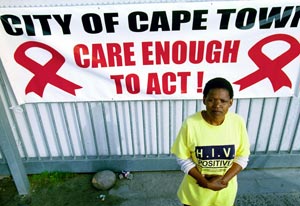Marking 10 years of PEPFAR's accomplishments
July / August 2013 | Volume 12, Issue 4
Opinion by Dr. Roger I. Glass
Director, Fogarty International Center
At the end of the last century, we were at the height of the HIV/AIDS epidemic. The deadly virus was spreading rapidly and killing scores of people in every corner of the world. Sub-Saharan Africa was struck particularly hard, with countless children orphaned and nearly an entire generation decimated. Something had to be done.
The U.S. responded with a new kind of global health program - the President's Emergency Plan for AIDS Relief or PEPFAR - launched by President George Bush in 2003. This year we celebrate a decade of PEPFAR's remarkable achievements in helping protect people against this deadly virus. The program has been active in 80 countries, saving at least 1 million babies from being inadvertently infected by their HIV-positive mothers and today providing antiretroviral drugs to more than 5 million patients who could not otherwise afford them.
NIH-funded research has provided essential guidance to PEPFAR as it planned treatment and prevention programs. For instance, a study in Haiti demonstrated that patients in resource-limited settings could comply well with complicated antiretroviral drug regimens. Research in Uganda confirmed that circumcised males were less likely to acquire HIV than those who were uncircumcised. And a multi-country study showed if patients began taking antiretroviral drugs as soon as possible after diagnosis, they were less likely to spread the disease to their sexual partners.
Many of the in-country scientists who were instrumental in these landmark studies were trained through Fogarty programs. We believe that by building local expertise we are creating the capacity necessary to improve health over the long term.
As PEPFAR began to transition from an emergency response program to a more sustainable model, its leadership focused on enabling countries to take ownership for their own HIV/AIDS programs. To support this shift, PEPFAR launched the Medical Education Partnership Initiative (MEPI) in 2010. Its objective is to increase the quality, quantity and retention of health care workers in 12 sub-Saharan countries. NIH contributes funds and Fogarty coadministers the program together with the Health Resources and Services Administration.

Photo by Trevor Samson/World Bank
Today PEPFAR provides antiretroviral drugs to
more than 5 million patients who could not otherwise
afford them.
We at Fogarty are proud to be playing this supporting role in MEPI. It's gratifying to witness the transformation of medical education in Africa. Curricula are being strengthened, incorporating electronic components such as procedure demonstration videos that enable distance learning. Institutions are upgrading their Internet connectivity, increasing access to current journal articles and building e-libraries of learning tools. They're developing programs to increase expertise in neglected areas such as emergency medicine, surgery, cancer and heart disease. Skills labs are being assembled to offer students the opportunity to practice surgeries and other procedures on lifelike models. Institutions are ramping up faculty recruitment and dramatically increasing enrollment. Finally, resources and lessons learned are being shared among the MEPI network members.
Some funds support research projects, not only to expand training and accumulate country-relevant data, but importantly as an enticement for faculty to remain in their institutions and help sustain medical capacity. Staff retention is a major issue in Africa, with higher salaries elsewhere causing a brain drain. Another problem is staffing clinics in rural areas, where most of Africa's population lives, so MEPI grantees are nurturing rural training facilities and recruiting students from local communities who are more likely to remain in place after completing their studies.
Since MEPI grants are made directly to African institutions, local leaders can decide how best to apply funding to meet their country's particular needs, and this is adding to their sense of ownership. MEPI institutions are working closely with their government ministries to ensure goals are aligned with country priorities and to foster support.
PEPFAR and MEPI together have helped enhance care delivery and research capacity in many creative ways. The future looks much brighter than it did a decade ago, when HIV/AIDS cast its ominous cloud, and we are optimistic that an AIDS-free generation is truly possible.
More Information
To view Adobe PDF files,
download current, free accessible plug-ins from Adobe's website.